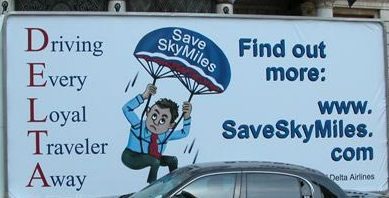This week Delta announced major changes to how SkyMiles elite status is earned, and to how people can access their club lounges.
The requirements for earning status were massively increased. For instance, a top tier Diamond needs 20,000 qualifying dollars this year to earn status. Going forward they’ll need 35,000 and there’s only qualifying dollars, no miles or segments as part of calculating status.
People with the $550 annual fee Delta Reserve credit card will no longer receive unlimited lounge access. Instead, unless they spend at least $75,000 a year on the card, they’ll be limited to 10 visits per year (so they’re paying up front for $55 per visit fees). And cardmembers will no longer be able to use lounges when flying basic economy. The least expensive SkyMiles award tickets are often basic economy.
There are consumer movements on Flyertalk and on Reddit to try to get Delta to reverse these changes.
So it’s worth noting that two decades ago Delta made major changes to how elite status was earned. For instance they decided to count only full fare tickets towards status-earning. It took two years, but the “Save SkyMiles” movement got those changes reversed.
- They signed petitions
- They took out ads, including in the Atlanta Journal-Constitution
- They hired a truck to drive a sign around outside at the airline’s annual shareholders meeting

In fact, leading up to 2008 it was fairly common to see negative frequent flyer program changes reversed.
- United required a Saturday stay on a roundtrip ticket in order to redeem a saver award. They rolled back the change amidst consumer backlash (while Northwest slipped in their own version of the change – which stuck for many years).
- United made systemwide upgrades redeemable only on nearly full fare (H and above) tickets in 2003. There was enough of an uproar that they even issued additional sweet spot certificates valid on nearly any fare for the same year, and had less restrictive international upgrades the following year (that still excluded the cheapest fares).
- US Airways planned to count only full fare tickets towards elite status. The public face of the airline explaining this change later became the CEO of Spirit Airlines. At the time he described customers buying the inexpensive tickets they offered as not having the kind of loyalty they were interested in. Later, as head of Spirit, he only wanted the highest fee ones!
- US Airways announced the end to flight bonuses for elite members in 2008 and reversed course. And they even did so retroactively. At the end of 2008 elites all received the flight bonuses they would have earned while the change was in place (May 1 – November 19, 2008).
The wins were happening in the early 2000s, following 9/11 and a recession, and around 2008 as the Great Recession was taking hold. Airlines were weak. Loyalty programs weren’t making big changes to their programs from 2009 through 2012.
What’s different now is that airlines are stronger.
- The federal government handed $59 billion in direct subsidies to airlines, and made another $25 billion available in subsidized loans. That’s on top of tax relief and Fed-induced low cost debt that was available broadly throughout the pandemic.
- Airlines are now making money. Demand for their product is strong, and airline co-brand deals are more lucrative. Delta will receive nearly $7 billion from American Express this year alone.
Delta has leverage. They’re tough negotiators, with suppliers, partners, and also with customers. That’s why they didn’t even feel the need to throw in any sweeteners when they devalued their premium co-brand card’s lounge access and told customers they needed to pay up a lot more or lose status.
So while consumer campaigns against negative changes to frequent flyer programs have worked before, they haven’t worked in recent times, and aren’t likely to work here. Delta will only reverse course if they see reduced spend on their co-brand card portfolio, which hits their bottom line.


After 23 years as a cardmember, I just called to cancel my Amex Delta Platinum card. $250 annual fee definitely not worth it. The value of the Delta Amex cards has been decimated. Whoever at Amex negotiated this deal ought to be fired and his/her stock options taken away. I will continue to use my Delta Reserve card through Dec 31 2023 to complete earning 2024 Diamond status, and then it will then be put in a drawer and not renewed in 2024. I am fine knowing I will revert to my 1M miler minimum status in 2025. What a sad end to a great program. I’m an international resident who enjoyed the MQD waiver and now Delta has completely abandoned us. Makes no sense to spend $35K on Delta to earn Diamond status and constantly miss out on upgrades when I can spend just $15K more on United and get incredible Global Services Status (Upgraded 99.99% of the time, even on international business class).
Me too